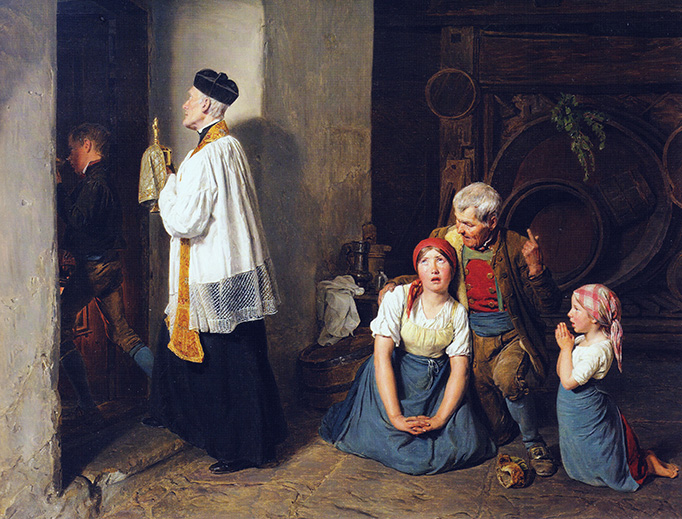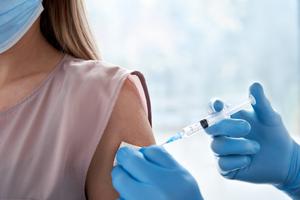If the Sacraments Aren’t Essential, Nothing Is Essential
The faithful need to be reminded, through words and deeds, that there is nothing more essential than the sacraments.

Last year, I wrote a column arguing that if priests and bishops refuse to stand up for the Sacrament of Matrimony, they will eventually grow reluctant to stand up for the other sacraments as well. I sorely hoped I would be wrong. With some of the clerical responses to COVID-19, however, that’s a prediction that has come true in ways far worse than I could have imagined.
For millions of Catholics — as we all know quite well — neither clerical Baptism nor Communion nor Confession nor Matrimony nor Confirmation nor Holy Orders nor Anointing of the Sick has been available for months.
The end-of-life sacramental issues have been the most newsworthy. In some dioceses in America, dying without the sacraments has become the new normal. Many a Catholic goes to bed at night worried that if he gets sick anytime soon — with any illness — his call to the rectory might go unanswered, and sacramentally unaddressed.
There have also been beginning-of-life sacramental issues, as infant baptisms have been postponed indefinitely. (Presumably, some Catholic parents have baptized their own babies during this time. But with catechetics as it is in America, many Catholic parents are unaware that they are sometimes permitted to baptize their own children — nor would they know how to baptize them.)
This is tragic.
The Code of Canon Law (867) states, “Parents are obliged to take care that infants are baptized in the first few weeks.” That’s a weighty obligation, especially when you consider why: “The Church does not know of any means other than Baptism that assures entry into eternal beatitude…” (CCC 1257).
Some might be quick to point out that God’s love and mercy is not confined to the sacraments; indeed, the Catechism states, “God has bound salvation to the sacrament of Baptism, but he himself is not bound by his sacraments.” Here, the Catechism makes a powerful point, but — if overemphasized — this can tempt us to laxity, as has been on such horrid display these last couple of months.
In other words, some Catholics might start thinking that if God does not truly require the sacraments, then why bother receiving them at all?
How many Catholics have been at home for the past three months asking themselves this question? How many have come to doubt the essential nature of the sacraments, or even of the Mass? In many ways and instances, the princes and prelates of the Church have sent a mixed message in this regard. There are those priests and bishops, for instance, who are happy about the ability to livestream Masses to American homes. Much as I’d like to share their optimism, I fear that they will come to serve as a trojan horse in the spiritual lives of Catholics — meaning that Catholics may come to see no essential difference between attending Mass in person and viewing a virtual Mass. But the difference is clear not only on a liturgical basis, but on a physical and metaphysical level as well.
In watching livestream Masses during the COVID-19 situation, it is not the case that we have been fulfilling our liturgical obligation; it is that the obligation has been abrogated. That is an essential difference that the priests and bishops should painstakingly make clear to the laity.
If approached with the proper disposition, watching Mass at home may constitute prayer, but it does not constitute “assisting” at Mass. As Pope Pius XII explains in Mediator Dei:
The worship rendered by the Church to God must be, in its entirety, interior as well as exterior. It is exterior because the nature of man as a composite of body and soul requires it to be so.…Every impulse of the human heart, besides, expresses itself naturally through the senses; and the worship of God, being the concern not merely of individuals but of the whole community of mankind, must therefore be social as well.…Exterior worship, finally, reveals and emphasizes the unity of the mystical Body, feeds new fuel to its holy zeal, fortifies its energy, intensifies its action day by day…” (emphasis added)
Most immediately, the faithful must understand the central importance of the Eucharist. Like many families, our family has made spiritual Communions during this time, but a spiritual Communion merely expresses the desire to receive Jesus sacramentally; it does not constitute receiving Jesus sacramentally. That is a metaphysical difference.
Yet, despite all this, there are those who will insist that they feel like they can attend Mass at home — that they “feel more spiritual” in their own living rooms. It is going to prove difficult to put that genie back in the bottle.
Some of those in the highest positions of power in the Church have failed to teach the central importance of the sacraments. And the response to COVID-19 has highlighted this glaring omission. To the priests who have been heroically serving during this crisis, we appreciate everything you’ve done. But please know this: we have hungered and thirsted for the sacraments, and we have been starving for the Holy Eucharist. We need you to remind us faithful through your words and deeds that there is nothing more essential than the sacraments.
- Keywords:
- coronavirus
- sacraments

















